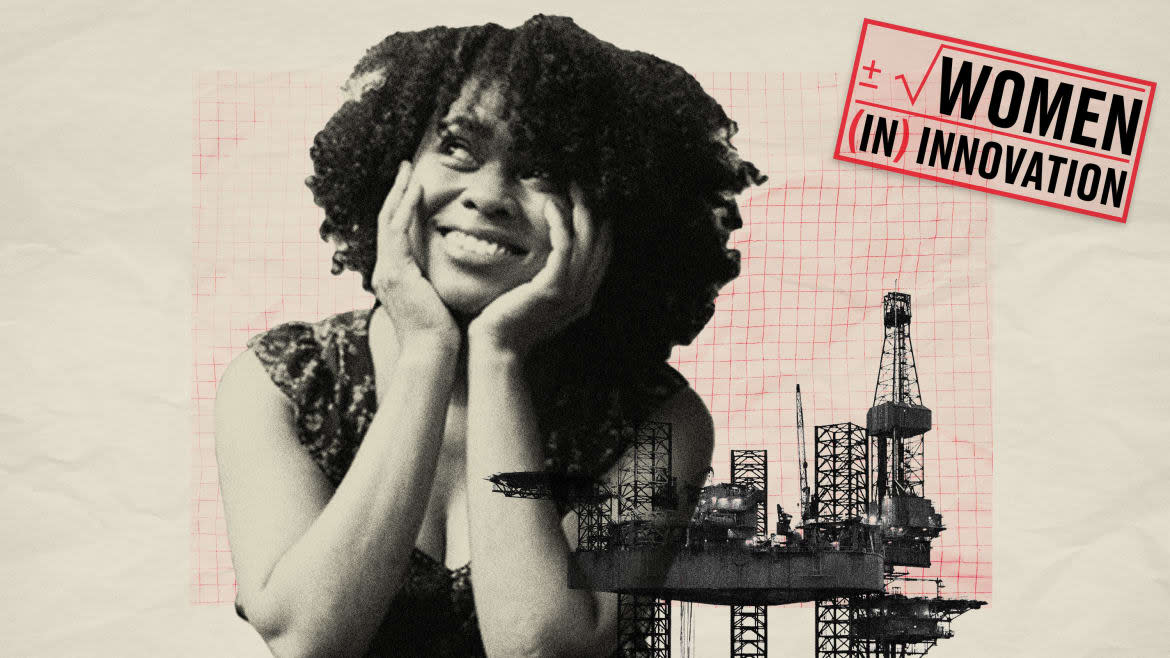Mary Annaïse Heglar Is on a Furious Crusade to Bully Big Oil Out of Existence

- Oops!Something went wrong.Please try again later.
On a recent video call, Mary Annaïse Heglar reminded me one last time that she is not a scientist. In fact, she sucks at science. That’s fine by me. I called to talk about her filthy mouth.
Heglar is a writer, podcaster, and social media vigilante. She pens moving emotional essays about climate justice with one hand and crafts a mean meme with the other. With a mixture of rage and delight, she takes the oil and gas industry to task for decades of willful environmental destruction, wielding the reply button like a throwing star and spewing f-bombs like greenhouse gases. She is petty, and she is pissed off with Big Oil.
“What’s dirtier: my words or their bullshit?” she asked, referring to fossil fuel companies that brag about their green-energy bona fides while driving the climate crisis and drilling for ever more oil. “They're gaslighting the entire planet, setting it on fire and telling you that you are the one that did it. They are framing us for our own genocide.”
This Ancient Fertilizer Is a Skeleton Key for Saving Earth
When I ventured that cursing is a valuable part of the climate dialog, she laughed. “If you can’t curse about climate change, what the fuck can you curse about?”
Heglar got on Twitter in 2017 looking for solace and catharsis. She’d been working for a few years at an environmental nonprofit editing policy publications, and was being kept up at night by the terrible profundity of climate change. “The thing that gave me the most nightmares was tar sands,” she told The Daily Beast. Extracting oil from tar sands emits far more carbon than pumping the oil straight out of the ground. The crude oil is poisonous and highly flammable—and, at the time, America’s plan was to import it from Canada, moving it underneath schools and churches, via the now-scuttled Keystone XL pipeline.
“I joined Twitter because I wanted to see if other people were talking about this,” says Heglar. Not just Keystone, not just tar sands, but all of it. All of this.
Her spelunking on the social media site sent a message to the algorithm that she was interested in fossil fuels, so Twitter served her lots of oil and gas advertisements. She made a game of flagging them as harmful and abusive. One day in 2019, an error message kept popping up while she was trying to report an ad from BP encouraging people to calculate their personal carbon footprints. Finally, out of sheer frustration, she hit Reply instead. “Bitch,” she tweeted at the oil giant, “what’s yours???”
The tweet went viral, and after that, “I decided instead of reporting these ads I'm going to dunk on them,” she said. “Just to be petty.” Soon she started trawling the Twitter feeds of the big four oil companies—BP, ExxonMobil, Chevron and Shell—to see “who had said the dumbest thing most recently,” so she could call them out, in real time, with a savage reply. It became a daily practice.

The fossil fuel companes are “gaslighting the entire planet, setting it on fire and telling you that you are the one that did it,” Heglar told The Daily Beast. “They are framing us for our own genocide.”
In a 2020 interview with Grist, a climate journalism nonprofit, she termed her approach “greentrolling.” It’s not the perfect moniker, she told me, trying to think of something a little more accurate and a little less corny. “Oil dragging,” maybe. It’s basically cyberbullying, she averred. But she contends that Big Oil is a bunch of bullies—and now it’s their turn.
Helgar is very much not a bully by nature, said journalist Amy Westervelt, who described Helgar as a “high-empathy super kind person.” Westervelt, Heglar’s co-writer and co-host on Hot Take, a climate change newsletter and podcast (relaunching next month on Crooked Media), said part of what makes her partner-in-outrage such an effective communicator is that she is “very good at painting a picture with words and at tapping into the emotions around climate.” Her takedowns eviscerate so efficiently because “she’s able to take messages that oil companies will often intentionally over-complicate and reveal them for the b.s. they are.”
Heglar has a few words for the people who simper, But what about the poor intern running [insert humongous oil company]’s social media? “Social media is not something that oil companies would assign to an intern,” she said. “They understand the importance of controlling the conversation and conversations are largely shaped on social media these days. They take that shit real seriously.”
Wresting control of the conversation is the whole bleeping point.
“I'm not trying to get BP to change,” she stressed. “I’m trying to get other people to understand who BP is. This is how you can attack the social license to operate.”

“Social media is not something that oil companies would assign to an intern,” Helgar told The Daily Beast. “They understand the importance of controlling the conversation and conversations are largely shaped on social media these days. They take that shit real seriously.”
“Social license to operate,” a term coined in the late 1990s, is the public acceptance of a company and its practices that allows it to keep doing what it’s doing. The fossil fuel industry depends heavily on convincing people that it cares about the world. Exposing their hypocrisy by drawing public attention to, say, flaming oil spills, reports of human rights atrocities—or even eye-roll-so-hard-you-see-your-own-brain social media gaffes—“helps to erode oil companies’ social license, and immediately discredit some of their talking points,” Westervelt said.
The approach is more powerful than it might appear. In August of 2020, while wildfires raged across the West (spurred on by a warmer, drier climate resulting from the burning of fossil fuels) Heglar woke up angry and checked the big four on Twitter to find that ExxonMobil had blocked her. “I smelled blood,” she said with a devilish twinkle in her eye. “I went after them pretty hard after that.”
A few months later, just before the presidential election, Shell made an unforced error, posting a Twitter poll that asked, “What are you willing to change to help reduce emissions?”
Heglar replied with a simple message for the people: “The oil and gas industry is gaslighting you.” Many others piled on. Among the respondents were climate activist Greta Thunberg, who said she was willing to call out the company for “knowingly destroying future living conditions” and trying to paper over the damage with greenwashing campaigns like this one. Representative Alexandria Ocasio-Cortez fired back at the company: “I’m willing to hold you accountable for lying about climate change for 30 years when you secretly knew the entire time that fossil fuels emissions would destroy our planet.”
After thousands of mentions, Shell issued a mealy-mouthed reply: “Changing the energy system requires everyone to play their part….Shell will reshape its portfolio of assets and products to meet the cleaner energy needs of its customers in the coming decades.” It served as only more fodder.
“Shell became the main character [of Twitter] for the day,” Heglar recalled, cracking up as she told the story. “It was like, ‘Fantastic, they're finally getting the type of negative attention that they deserve. They’re finally getting canceled.’ That was a really great moment.”
Nowadays, Heglar has noticed fossil fuel companies no longer tweet about personal responsibility the way they used to; they know they won’t get away with it.
She is thrilled to see an “army” of “expert trolls” taking up the mantle. It’s especially gratifying right now, she said, to watch people bully the American Petroleum Institute, the oil and gas industry’s biggest trade and lobbying group, which is using Russia’s invasion of Ukraine as a platform to push for expanding domestic production—as though more gas is a panacea, rather than a cause.
“I'm so glad that people know who they are,” said Heglar. A couple years ago, API’s social media posts got little engagement from users. “But now they've been discovered and outed as the villains of the climate story.” A recent API tweet contesting a statement from Sen. Bernie Sanders, for example, was met with a string of gifs and blatant profanity from average users all over the internet—not just blue checks.
Why Canada’s Largest Fleet of Drones Has Taken Over This Small Island
“You do not need to understand all of the science to be part of this conversation, to troll these companies,” said Heglar. “A quick ‘Fuck you’ will do it.”
The easiest way to get started? When an oil company tweets about some green energy effort, Google them doing the opposite, Heglar advised. “You will find it because they’re always doing it. And just send it back to them and be like, ‘This you?’”
“You don’t need to break down the science to these people because they know the science,” she explained. “They found out about climate change before anybody else and decided they didn’t give a fuck. You’re trolling for the other people to see it. Because if you don’t know any better, you might believe that BP is… on the right side of history. They’re not.”
Get the Daily Beast's biggest scoops and scandals delivered right to your inbox. Sign up now.
Stay informed and gain unlimited access to the Daily Beast's unmatched reporting. Subscribe now.

